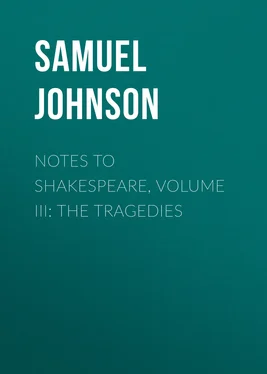Samuel Johnson - Notes to Shakespeare, Volume III - The Tragedies
Здесь есть возможность читать онлайн «Samuel Johnson - Notes to Shakespeare, Volume III - The Tragedies» — ознакомительный отрывок электронной книги совершенно бесплатно, а после прочтения отрывка купить полную версию. В некоторых случаях можно слушать аудио, скачать через торрент в формате fb2 и присутствует краткое содержание. Жанр: foreign_prose, Критика, literature_18, foreign_antique, на английском языке. Описание произведения, (предисловие) а так же отзывы посетителей доступны на портале библиотеки ЛибКат.
- Название:Notes to Shakespeare, Volume III: The Tragedies
- Автор:
- Жанр:
- Год:неизвестен
- ISBN:нет данных
- Рейтинг книги:5 / 5. Голосов: 1
-
Избранное:Добавить в избранное
- Отзывы:
-
Ваша оценка:
- 100
- 1
- 2
- 3
- 4
- 5
Notes to Shakespeare, Volume III: The Tragedies: краткое содержание, описание и аннотация
Предлагаем к чтению аннотацию, описание, краткое содержание или предисловие (зависит от того, что написал сам автор книги «Notes to Shakespeare, Volume III: The Tragedies»). Если вы не нашли необходимую информацию о книге — напишите в комментариях, мы постараемся отыскать её.
Notes to Shakespeare, Volume III: The Tragedies — читать онлайн ознакомительный отрывок
Ниже представлен текст книги, разбитый по страницам. Система сохранения места последней прочитанной страницы, позволяет с удобством читать онлайн бесплатно книгу «Notes to Shakespeare, Volume III: The Tragedies», без необходимости каждый раз заново искать на чём Вы остановились. Поставьте закладку, и сможете в любой момент перейти на страницу, на которой закончили чтение.
Интервал:
Закладка:
— and perish springs .
The verb perish is commonly neutral, but in conversation is often used actively, and why not in the works of a writer negligent beyond all others of grammatical niceties?
V.ii.60 (427,2) Back, I say, go; lest I let forth your half pint of blood;—back, that's the utmost of your having:—Back] [Warburton emended the punctuation] I believe the meaning never was mistaken, and therefore do not change the reading.
V.ii.69 (428,3) guess by my entertainment with him] I read, Guess by my entertainment with him, if thou standest not i' the state of hanging [in place of guess but my entertainment ].
V.ii.80 (428,4) Though I owe/My revenge properly] Though I have a peculiar right in revenge, in the power of forgiveness the Volacians are conjoined.
V.ii.104 (429,5) how we are shent] Shent is brought to destruction .
V.iii.3 (430,6) how plainly/I have born this business] That is, how openly, how remotely from artifice or concealment.
V.iii.39 (431,7) The sorrow, that delivers us thus chang'd,/Makes you think so] Virgilia makes a voluntary misinterpretation of her husband's words. He says, These eyes are not the same , meaning, that he saw things with other eyes , or other dispositions . She lays hold on the word eyes , to turn his attention on their present appearance.
V.iii.46 (431,8) Now by the jealous queen of heaven] That is, by Juno , the guardian of marriage, and consequently the avenger of connubial perfidy.
V.iii.64 (432,1) The noble sister of Poplicola] Valeria, methinks, should not have been brought only to fill up the procession without speaking.
V.iii.68 (432,2) epitome of yours] I read,
—epitome of you.
An epitome of you which, enlarged by the commentaries of time , may equal you in magnitude.
V.iii.74 (433,4) every flaw] That is, every gust , every storm .
V.iii.100 (435,2) Constrains them weep, and shake] That is, constrain the eye to weep , and the heart to shake .
V.iii.149 (436,3) the fine strains] The niceties, the refinements.
V.iii.159 (436,5) he lets me prate,/Like one i' the stocks] Keep me in a state of ignominy talking to no purpose.
V.iii.176 (437,6) Does reason our petition] Does argue for us and our petition.
V.iii.201 (438,7) I'll work/Myself a former fortune] I will take advantage of this concession to restore myself to my former credit and power.
V.iii.206 (438,8) Come, enter with us,—Ladies, you deserve] [Warburton proposed to give the speech beginning "Ladies, you deserve" to Aufidius] The speech suits Aufidius justly enough, if it had been written for him; but it may, without impropriety, be spoken by Coriolanus: and since the copies give it to him, why should we dispossess him?
V.iv.22 (439,1) He sits in state as a thing made for Alexander] In a foregoing note he was said to sit in gold . The phrase, as a thing made for Alexander , means, as one made to resemble Alexander .
V.vi.39 (443,2) He wag'd me with his countenance] This is obscure. The meaning, I think, is, he prescribed to me vith an air of authority, and gave me his countenance for my wages ; thought me sufficiently rewarded with good looks.
V.vi.44 (443,3) For which my sinews shall be stretch'd upon him] This is the point on which I will attack him with my utmost abilities.
V.vi.66 (444,4) answering us/With our own charge] That is, rewarding us with our own expences ; making the cost of the war its recompence.
V.vi.125 (446,5) his fame folds in/This orbe o' th' earth] His fame overspreads the world.
(447) General Observation. The tragedy of Coriolanus is one of the most amusing of our author's performances. The old man's merriment in Menenius; the lofty lady's dignity in Volumnia; the bridal modesty in Virgilia; the patrician and military haughtiness in Coriolanus; the plebeian malignity and tribunitian insolence in Brutus and Sicinius, make a very pleasing and interesting variety: and the various revolutions of the hero's fortune fill the mind with anxious curiosity. There is, perhaps, too much bustle in the first act, and too little in the last.
Vol. VIII
JULIUS CAESAR
I.i.20 (4,2) Mar. What meanest thou by that?] [Theobald gave this speech to Flavius] I have replaced Marullus , who might properly enough reply to a saucy sentence directed to his colleague, and to whom the speech was probably given, that he might not stand too long unemployed upon the stage.
I.ii.25 (7,5) [ Sennet. Exeunt Caesar and Train ] I have here inserted the word Sennet , from the original edition, that I may have an opportunity of retracting a hasty conjecture in one of the marginal directions in Henry VIII. Sennet appears to be a particular tune or mode of martial musick.
I.ii.35 (8,6) You bear too stubborn and too strange a hand] Strange , is alien, unfamiliar, such as might become a stranger.
I.ii.39 (8,7) Vexed I am,/Of late, with passions of some difference] With a fluctation of discordant opinions and desires.
I.ii.73 (9,9) To stale with ordinary oaths my love/To every new protester] To invite every new protestor to my affection by the stale or allurement of customary oaths.
I.ii.87 (10,1) And I will look on both indifferently] Dr. Warburton has a long note on this occasion, which is very trifling. When Brutus first names honour and death , he calmly declares them indifferent; but as the image kindles in his mind, he sets honour above life . Is not this natural?
I.ii.160 (12,6) eternal devil] I should think that our author wrote rather, infernal devil .
I.ii.171 (13,7) chew upon this] Consider this at leisure; ruminate on this.
I.ii.186 (13,8) Looks with such ferret, and such fiery eyes] A ferret has red eyes.
I.ii.268 (16,2) a man of any occupation] Had I been a mechanick, one of the Plebeians to whom he offered his threat.
I.ii.313 (17,3) Thy honourable metal may be wrought/From what it is dispos'd] The best metal or temper may be worked into qualities contrary to its original constitution.
I.ii.318 (17,4) If I were Brutus now, and he were Cassius,/He should not humour me] The meaning, I think, is this, Caesar loves Brutus, but if Brutus and I were to change places, his love should not humour me , should not take hold of my affection, so as to make me forget my principles.
I.iii.1 (18,5) brought you Caesar home?] Did you attend Caesar home?
I.iii.3 (18,6) sway of earth] The whole weight or momentum of this globe.
I.iii.21 (19,7) Who glar'd upon me] The first edition reads,
Who glaz'd upon me ,—
Perhaps, Who gaz'd upon me .
I.iii.64 (20,8) Why birds, and beasts, from quality and kind] That is, Why they deviate from quality and nature. This line might perhaps be more properly placed after the next line.
Why birds, and beasts, from quality and kind;
Why all these things change from their ordinance.
I.iii.65 (20,9) and children calculate] [Shakespeare, with his usual liberty, employs the species [calculate] for the genus foretel]. WARB.] Shakespeare found the liberty established. To calculate a nativity , is the technical term.
I.iii.l14 (22,2) My answer must be made] I shall be called to account, and must answer as for seditious words.
Читать дальшеИнтервал:
Закладка:
Похожие книги на «Notes to Shakespeare, Volume III: The Tragedies»
Представляем Вашему вниманию похожие книги на «Notes to Shakespeare, Volume III: The Tragedies» списком для выбора. Мы отобрали схожую по названию и смыслу литературу в надежде предоставить читателям больше вариантов отыскать новые, интересные, ещё непрочитанные произведения.
Обсуждение, отзывы о книге «Notes to Shakespeare, Volume III: The Tragedies» и просто собственные мнения читателей. Оставьте ваши комментарии, напишите, что Вы думаете о произведении, его смысле или главных героях. Укажите что конкретно понравилось, а что нет, и почему Вы так считаете.












